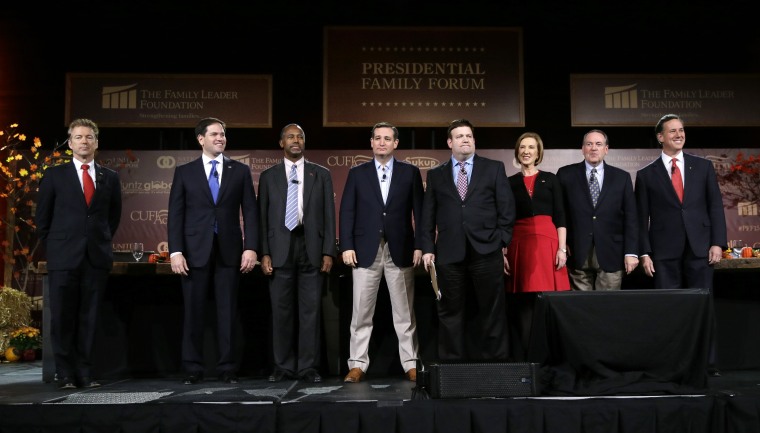In politics, it's supposedly better to be strong and wrong than weak and right. The entire 2016 Republican presidential field is putting that wisdom to the test when it comes to climate change.
The Associated Press invited eight climate and biological scientists to grade the scientific accuracy of candidates in both parties. The material included debates, published interviews and tweets. The candidates' names were not known to the reviewers. As an added protection against bias, the scientists were selected by professional scientific societies.
The grades, which ran from 0 to 100, were mostly abysmal.
RELATED: Paris climate summit: A bluffer's guide
Texas Sen. Ted Cruz was the strongest and the wrongest, receiving a grade of 6 points for accuracy. All eight evaluators placed Cruz dead last. Michael Mann, a Pennsylvania State University meteorology professor, wrote of Cruz's statements: "This individual understands less about science (and climate change) than the average kindergartner."
Florida Sen. Marco Rubio did more than three times as well as Cruz but still failed — scoring a 21 out of 100.
Among his offending statements, this one from a debate in September: "We are not going to make America a harder place to create jobs in order to pursue policies that will do absolutely nothing, nothing, to change our climate, to change our weather, because America is a lot of things, the greatest country in the world, absolutely. But America is not a planet."
He is right — America is not a planet. That's true enough. But the scientists disputed Rubio's claim that the U.S. alone can do little to address climate change. In fact, America is responsible for 17% of the world's carbon emissions. "Big cuts here would still make a big difference globally," geochemist Louisa Bradtmiller of Macalester College told the Associated Press.
Rubio also took an unscientific detour in August, telling an interviewer: "If you look at satellite data for the last 18 years, there's been zero warming. ... The satellite says it ain't happening."
RELATED: Prince Charles is right: Climate change is a driver of conflict
Sort of, Marco. The scientists said that federal ground-based data — the most reliable kind — show that 15 of the 17 years after 1997 have been warmer than 1997, and 2015 is on track to top 2014 as the warmest year on record.
Mogul Donald Trump scored a 15 out of 100, which was better than Cruz and retired neurosurgeon Ben Carson. But something about Trump's errors seemed to draw harsher comments from the reviewers.
Harvard professor Jim McCarthy, a former president of the American Association for the Advancement of Science, dismissed Trump's comments as "nonsense." Emmanuel Vincent, a climate scientist at the University of California, Merced, said, "the candidate does not appear to have any commitment to accuracy."
The top Republican performer was former Florida Gov. Jeb Bush, who averaged a 64. The rest of the Republican field flunked: New Jersey Gov. Chris Christie, 54; Ohio Gov. John Kasich, 47; Kentucky Sen. Rand Paul, 38; former Hewlett Packard CEO Carly Fiorina, 28; Ben Carson, 13.
On the Democratic side, the scores were higher — much, much higher.
RELATED: Billionaire Tom Steyer’s climate group launches seven-figure ad campaign
Former Secretary of State Hillary Clinton scored a 94 while former Maryland governor Martin O'Malley earned a 91. Vermont Sen. Bernie Sanders was the worst performer on the Democratic side, bringing in an 87. He was downgraded for "exaggeration" during one of the debates, when he suggested that the earth may become "uninhabitable."
"I would not say that the planet will become uninhabitable," said Andrew Dessler, a scientist at Texas A&M University. "Regardless of what we do, some humans will survive."
Harvard's Jim McCarthy also called the comment an overstatement. Toward the end of the century, there will be a few days each decade or so when humans cannot survive outside, in some areas, he said, but we could still live with air conditioning indoors.
Sanders has yet to protest his score.
